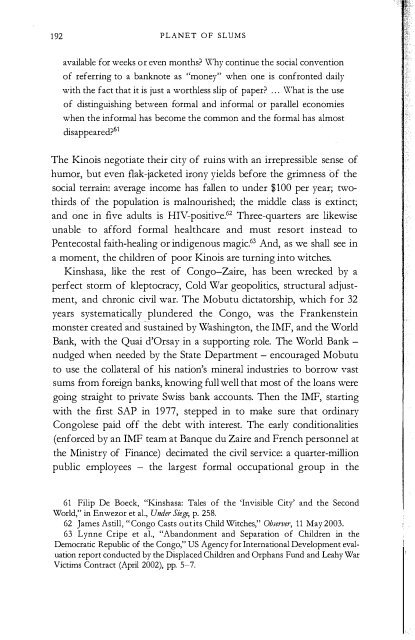Untitled - Rebel Studies Library
Untitled - Rebel Studies Library
Untitled - Rebel Studies Library
Create successful ePaper yourself
Turn your PDF publications into a flip-book with our unique Google optimized e-Paper software.
192<br />
PLANET OF SLUMS<br />
available for weeks or even months? Why continue the social convention<br />
of referring to a banknote as "money" when one is confronted daily<br />
with the fact that it is just a worthless slip of paper? ... What is the use<br />
of distinguishing between formal and informal or parallel economies<br />
when the informal has become the common and the formal has almost<br />
disappeared? 61<br />
The Kinois negotiate their city of ruins with an irrepressible sense of<br />
humor, but even flak-jacketed irony yields before the grimness of the<br />
social terrain: average income has fallen to under $100 per year; twothirds<br />
of the population is malnourished; the middle class is extinct;<br />
and one in five adults is HIV-positive.62 Three-quarters are likewise<br />
unable to afford formal healthcare and must resort instead to<br />
Pentecostal faith-healing or indigenous magic.63 And, as we shall see in<br />
a moment, the children of poor Kinois are turning into witches.<br />
Kinshasa, like the rest of Congo-Zaire, has been wrecked by a<br />
perfect storm of kleptocracy, Cold War geopolitics, structural adjustment,<br />
and chronic civil war. The Mobutu dictatorship, which for 32<br />
years systematically plundered the Congo, was the Frankenstein<br />
monster created and sustained by Washington, the IMF, and the World<br />
Bank, with the Quai d'Orsay in a supporting role. The World Bank <br />
nudged when needed by the State Department - encouraged Mobutu<br />
to use the collateral of his nation's mineral industries to borrow vast<br />
sums from foreign banks, knowing full well that most of the loans were<br />
going straight to private Swiss bank accounts. Then the IMF, starting<br />
with the first SAP in 1977, stepped in to make sure that ordinary<br />
Congolese paid off the debt with interest. The early conditionalities<br />
(enforced by an IMF team at Banque du Zaire and French personnel at<br />
the Ministry of Finance) decimated the civil service: a quarter-million<br />
public employees - the largest formal occupational group in the<br />
61 Filip De Boeck, "Kinshasa: Tales of the 'Invisible City' and the Second<br />
World," in Enwezor et aI., Under Siege, p. 258.<br />
62 James Astill, "Congo Casts out its Child Witches," ObJerver, 11 May 2003.<br />
63 Lynne Cripe et aI., "Abandonment and Separation of Children in the<br />
Democratic Republic of the Congo," US Agency for International Development evaluation<br />
report conducted by the Displaced Children and Orphans Fund and Leahy War<br />
Victims Contract (April 2002), pp. 5-7.<br />
A SURPLUS HUMANITY? 193<br />
economy - were laid off without benefits. Those who remained punctually<br />
turned to embezzlement and graft ("Article 1S") on an epic scale,<br />
with Mobutu's public endorsement.<br />
A decade later, with the Congo's once-impressive infrastructure rusted<br />
or looted, the IMF imposed a new SAP. Tshikala Biaya describes how the<br />
1987 agreement "sought to give 'legal power' to the informal sector and<br />
make it a new milch cow which would replace the welfare state that the<br />
IMF and the World Bank had just destroyed." The Club of Paris rolled<br />
over Mobutu's debt in exchange for further retrenchment in the public<br />
sector, more market openness, privatization of state companies, removal<br />
of exchange controls, and increased export of diamonds. Foreign<br />
imports flooded Zaire, home industries closed down, and another<br />
100,000 jobs were lost in Kinshasa. Hyperinflation promptly destroyed<br />
the monetary system and any semblance of economic rationality.64<br />
"Money," wrote Rene Devisch, "appeared to be a mysterious and<br />
fantastic entity, retaining no relation to either labor or production.<br />
People came to seek refuge in an economy of fortune."65 The Kinois,<br />
indeed, were caught up in a desperate frenzy of betting: French horse<br />
races, lotteries organized by the big breweries, bottle cap games by the<br />
soft drink companies, and, most fatefully, a pyramidal money scheme,<br />
secretly controlled by the military. (A similar quasi-magical "pyramidmania"<br />
would sweep Albania with equally devastating results in 1996-97,<br />
sucking up and destroying half the impoverished nation's GDP')66 Initial<br />
investors won radios or appliances from South Africa, inducing<br />
everyone else to gamble that they could board the scheme and then disembark<br />
before it crashed - but there were few survivors of the<br />
inevitable disaster. As Devisch explains, "With such a large part of the<br />
population of Kinshasa involved in these financial schemes, the effects<br />
of the collapse on the economy, and especially the informal sector, were<br />
64 Tshikala Biaya, "SAP: A Catalyst for the Underdevelopment and Privatization<br />
of Public Administration in the Democratic Republic of Congo, 1997-2000," DPMN<br />
Bulletin 7:3 (December 2000).<br />
65 Devisch, "Frenzy, Violence, and Ethical Renewal in Kinshasa," p. 604.<br />
66 See analyses by World Bank researchers: Carlos Elbirt, "Albania under the<br />
Shadow of the Pyramids;" and Utpal Bhattacharya, "On the Possibility of Ponzi<br />
Schemes in Transition Economies," in Transition Newsletter (newsletter published by the<br />
World Bank Group) (January-February 2000), (www:worldbank.org/transitionnewsletter/janfeb600/pgs24-26.htm).


